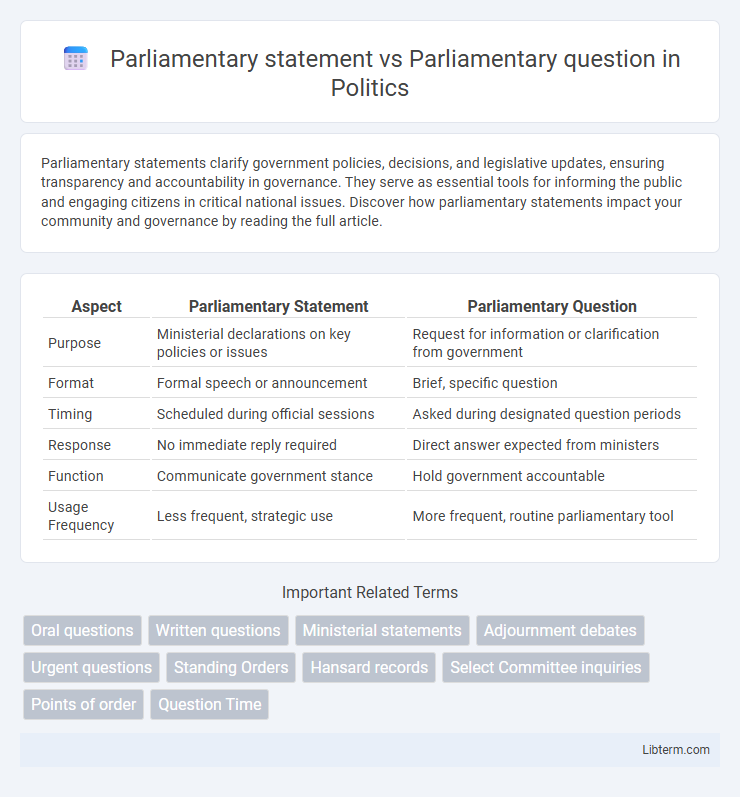Parliamentary statements clarify government policies, decisions, and legislative updates, ensuring transparency and accountability in governance. They serve as essential tools for informing the public and engaging citizens in critical national issues. Discover how parliamentary statements impact your community and governance by reading the full article.
Table of Comparison
| Aspect | Parliamentary Statement | Parliamentary Question |
|---|---|---|
| Purpose | Ministerial declarations on key policies or issues | Request for information or clarification from government |
| Format | Formal speech or announcement | Brief, specific question |
| Timing | Scheduled during official sessions | Asked during designated question periods |
| Response | No immediate reply required | Direct answer expected from ministers |
| Function | Communicate government stance | Hold government accountable |
| Usage Frequency | Less frequent, strategic use | More frequent, routine parliamentary tool |
Introduction to Parliamentary Statements and Questions
Parliamentary statements are formal declarations made by government ministers to inform the parliament about policies, decisions, or current issues, providing essential updates for legislative transparency. Parliamentary questions serve as a critical tool for members to seek information or hold the government accountable, enabling direct inquiries into administrative actions or public concerns. Both mechanisms enhance democratic oversight and promote informed debate within the parliamentary framework.
Defining Parliamentary Statements
Parliamentary statements are formal communications delivered by ministers or members within legislative sessions to inform or update the house on governmental policies, decisions, or official matters. These statements are typically prepared, structured, and address broad or specific issues without requiring immediate responses from other members. Unlike parliamentary questions, which seek specific information or clarifications, parliamentary statements serve to declare positions, announce initiatives, or provide explanations on public interest topics.
Understanding Parliamentary Questions
Parliamentary questions are formal inquiries submitted by members of parliament to ministers, aimed at obtaining specific information or explanations about government policies and actions. These questions are structured to hold the government accountable and can be oral or written, with oral questions often requiring concise and direct responses during parliamentary sessions. Understanding parliamentary questions is essential for grasping how legislators scrutinize executive decisions and address constituents' concerns through transparent communication.
Purpose of Parliamentary Statements
Parliamentary statements serve to inform lawmakers and the public about government policies, decisions, or developments, ensuring transparency and accountability. They provide official explanations or updates directly from ministers, helping clarify complex issues or government actions. Parliamentary questions, in contrast, primarily seek to obtain information or hold the government accountable through direct inquiries.
Objectives of Parliamentary Questions
Parliamentary questions serve to obtain specific information from the government, ensuring transparency and accountability in legislative processes. They enable members of parliament to request explanations on policies, decisions, and administrative actions, facilitating detailed scrutiny of government functions. Unlike parliamentary statements which present information voluntarily, parliamentary questions compel official responses, promoting active oversight and responsiveness.
Key Differences between Statements and Questions
Parliamentary statements are formal announcements made by ministers or members to convey information or policy updates directly to the house, whereas parliamentary questions are inquiries posed by members to seek specific information or hold the government accountable. Statements do not usually require an immediate response or debate, while questions demand answers that may lead to further discussion. The key differences lie in their purpose, format, and procedural handling during parliamentary sessions.
Procedures for Making Statements in Parliament
Parliamentary statements are formal communications by members or government officials delivered during a designated time in the parliamentary session, outlining policies, decisions, or important developments without the need for immediate debate. Parliamentary questions involve members submitting inquiries to ministers, requiring official responses either orally during question time or in written form, facilitating accountability and transparency. Procedures for making statements typically require prior notice and adherence to timing rules set by parliamentary standing orders, ensuring orderly communication within the legislative process.
Protocols for Asking Parliamentary Questions
Parliamentary questions follow strict protocols requiring clear submission within designated timeframes and adherence to specified formats, enabling ministers to provide precise and accountable responses. They must be relevant to government business and avoid hypothetical or opinion-based content to ensure parliamentary efficiency and transparency. Unlike parliamentary statements, which are formal announcements made by members, parliamentary questions are structured tools for obtaining information or pressing for government action.
Impact on Parliamentary Accountability
Parliamentary statements allow government officials to provide detailed explanations or updates on policy matters, fostering transparency and enabling informed scrutiny by the legislature. Parliamentary questions compel ministers to respond to specific inquiries, promoting accountability by requiring immediate and direct answers about government actions and decisions. Together, these mechanisms enhance parliamentary oversight by ensuring continuous government responsiveness and public disclosure.
Conclusion: The Role of Statements and Questions in Legislative Processes
Parliamentary statements provide authoritative information or government positions, shaping legislative discourse with clarity and official context. Parliamentary questions serve as tools for accountability, enabling legislators to seek specific information and challenge administrative actions. Together, these mechanisms ensure transparent governance and informed decision-making within the legislative process.
Parliamentary statement Infographic

 libterm.com
libterm.com